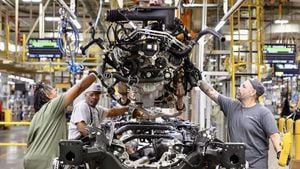In the fast-paced world of marketing, 2025 is shaping up to be a transformative year as agencies embrace artificial intelligence (AI) and other technological advancements to redefine their strategies. With consumer expectations evolving rapidly, agencies are focusing on leveraging AI to enhance user experiences, diversify content strategies, and automate tasks to stay competitive.
The integration of AI into marketing strategies is not just about efficiency; it’s about creating meaningful engagement. Franco Aquino, Co-Founder of REN Marketing, emphasizes that while AI tools are becoming mainstream, the true differentiator will be how agencies prioritize user experiences. “Creators are adopting AI quickly,” Aquino noted. “This is great for early adopters but in a short amount of time, it may not be a differentiator. Being able to excel in high-quality user-generated content will separate the one-hit wonders from those that will grow long-term.”
As agencies navigate the challenges posed by AI, they are also confronting the decline in organic reach. Joy Hawkins, Owner/President of SterlingSky, highlighted the impact of AI on website traffic, stating, “We’re starting to see sites lose traffic due to AI Overviews.” This shift necessitates a diversification of content channels to maintain visibility. Tanya Wigmore, Chief Growth Officer & General Manager of Cronyx Digital, explained, “2025 is going to be all about diversification.” She suggests that agencies must expand their content types to include video and audio, alongside traditional text content.
Marketers are also encouraged to experiment with new tactics and track their effectiveness. Jake Meline, Associate Director of Sales Operations at Accelerated Digital Marketing, remarked, “This is a great time for marketers to test out new avenues to reach audiences.” He stressed the importance of tracking performance at each touchpoint to ensure that AI-driven campaigns are optimized toward the right goals.
Moreover, presenting brands authentically is crucial for connecting with audiences. Ben Wright, Founder/CEO of Risely Marketing, urges marketers to “be human!” He believes that agencies that help their clients build incredible brands will ultimately win in this new landscape. Sharing real customer and employee stories can enhance authenticity and foster deeper connections.
Automation is another key trend, with marketers planning to utilize AI-driven tools for customer data analytics, lead intelligence, and marketing automation. Blake Akers, CEO of Webology, LLC, noted the potential for automating repetitive tasks, which could significantly lower the costs of SEO services in the near future. “Imagine automating repetitive tasks like installing a Google Ads container in WordPress!” he exclaimed.
Another exciting development is the rise of no-code platforms, which allow agencies to create customer-centric tools without requiring extensive programming knowledge. Andrew Peluso, CEO & Owner of Bananas Agency, highlighted the trend of AI-first, no-code tool creation, stating, “Building useful, customer-centric tools has never been easier.” This shift enables marketers to innovate more rapidly and efficiently.
As AI continues to influence search engine optimization (SEO), agencies are adapting their strategies to cater to both traditional search engines and AI-driven search interfaces. Patricia Walterick, CEO of Open Space Digital, explained that marketers need to focus on optimizing content for AI platforms. Key trends include the emergence of an AI backlink ecosystem and the necessity for optimizing content to be AI-friendly.
On the consumer side, the demand for personalized experiences is on the rise. Denis Sinelnikov, CEO of Media Components and Curis Digital, notes that AI can help marketers provide tailored experiences that meet consumer preferences in real time. “The brands that succeed will be those that seamlessly integrate AI while maintaining authenticity and building trust with their audiences,” he said.
Voice search is another area gaining traction, with marketers needing to optimize for spoken queries as devices like smart speakers become more prevalent. Sinelnikov advises crafting conversational content that aligns with natural language patterns to improve discoverability in voice searches.
Immersive marketing is also set to make waves in 2025, with augmented reality (AR) and virtual reality (VR) technologies enhancing consumer engagement. Retailers are already using AR for virtual try-ons, and the potential for fully interactive virtual storefronts is on the horizon. Sinelnikov believes that as these technologies mature, they will play a significant role in customer engagement strategies.
Data privacy is becoming increasingly important, with legislation like the General Data Protection Regulation and the California Consumer Privacy Act shaping how marketers handle consumer information. As first-party data becomes a valuable asset, brands must prioritize transparency and ethical data use, turning privacy law compliance into a competitive advantage.
Social commerce is emerging as a critical component of online retail, with platforms like Instagram and TikTok facilitating seamless integration between content and purchase functionality. This trend requires marketers to balance storytelling with salesmanship, ensuring that authenticity remains at the forefront of their campaigns.
Finally, sustainability is becoming a marketing imperative, with consumers gravitating toward brands that align with their values. Marketers are encouraged to showcase their commitment to sustainability through transparent communication and tangible actions while avoiding greenwashing.
As we look ahead to 2025, the interplay between AI, data, and consumer expectations presents both challenges and opportunities for marketers. Those who can blend creativity with technical expertise will not only thrive but also set new benchmarks for innovation and success in the ever-evolving digital marketing landscape.





